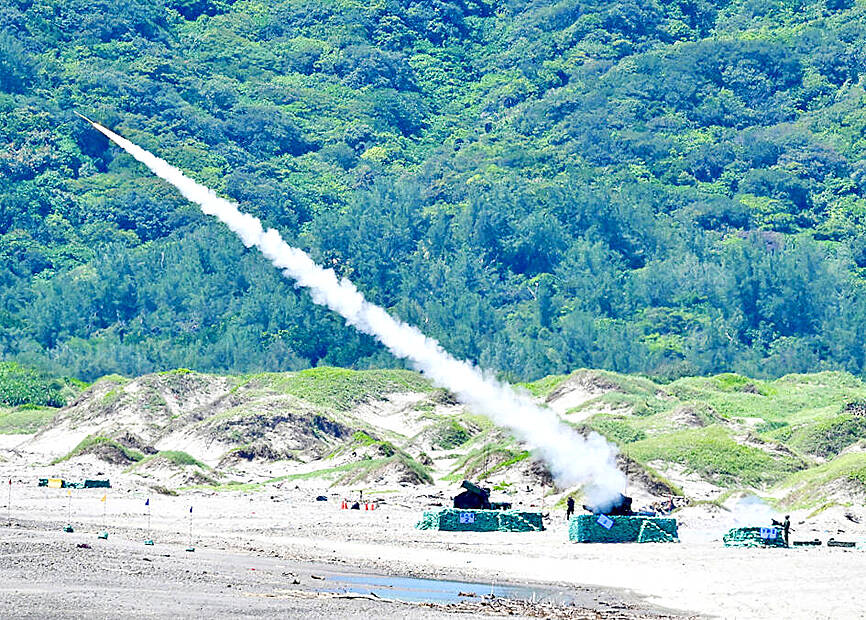Taiwan hopes to increase the number of Stinger missiles being obtained via US arms sales almost fivefold from 500 systems to 2,485, the Ministry of National Defense told lawmakers in a budget report.
The army would take over the Stinger program from the navy and change the order to add 1,985 missiles and 549 gripstock-control groups, as well as identification friend or foe (IFF) transponders, the ministry said in the document filed to the legislature last week.
Delivery of the missiles was scheduled to be completed in 2031, it said.

Photo: Lo Pei-te, Taipei Times
The budget allotted to the program would increase to NT$69 billion (US$2.16 billion) from NT$13.37 billion, it said.
The US has authorized the changes to the deal, the ministry added.
The ministry said it initially planned to buy 250 missiles, 108 gripstocks and 108 IFF transponders for the army, and 250 missiles, 70 gripstocks and 62 transponders for the navy. The navy later added 45 missiles, 15 gripstocks and 15 transponders to its order. Whether the revised deal includes the navy’s addition was unknown.
A defense official said on condition of anonymity that the ministry increased the order to deal with a rise in tensions across the Taiwan Strait.
The incursions into Taiwan’s air defense identification zone by the Chinese military show that ground forces urgently need to boost their air defense capabilities against aircraft and drones, the official said.
The FIM-92 Stinger, a short-range surface-to-air missile with a range of 4,800m, is typically operated by a crew of two, but can be fired by a single operator.
The first batch of Stinger missiles — to be delivered next year — would go to army and marine units, military police guarding Taipei, navy ships and coast guard garrisons in the Pratas Islands (Dongsha Islands, 東沙群島) and Spratly Islands (Nansha Islands, 南沙群島), the ministry said.
The second batch to be delivered by 2031 would be held in reserve, it added.
Separately, the ministry said in the budget report that the air force next year is expected to spend a record NT$43.7 billion on maintenance and repairs to sustain its aircraft and facilities.
The sum would be a 16 percent increase compared with NT$36.8 billion this year and a 50 percent increase compared with last year, the report said.
Next year’s budget includes a NT$23.7 billion component to obtain spare parts for aircraft from fighter jets to cargo planes, as well as ground equipment, and NT$20 billion for maintenance and repair, it said.
Air force expenditure to maintain weapons systems and facilities have increased 224 percent in the past eight years.
Beijing’s military flights around Taiwan began when Tsai Ing-wen (蔡英文) was elected president in 2016 and escalated after then-US House of Representatives speaker Nancy Pelosi visited Taipei in 2022.
Tasked with monitoring and intercepting Chinese aircraft, the air force has been increasing spending on airframe maintenance and placed an order for 66 Lockheed-Martin F-16V jets and parts, which the US is expected to deliver in full by 2026.

US President Donald Trump yesterday announced sweeping "reciprocal tariffs" on US trading partners, including a 32 percent tax on goods from Taiwan that is set to take effect on Wednesday. At a Rose Garden event, Trump declared a 10 percent baseline tax on imports from all countries, with the White House saying it would take effect on Saturday. Countries with larger trade surpluses with the US would face higher duties beginning on Wednesday, including Taiwan (32 percent), China (34 percent), Japan (24 percent), South Korea (25 percent), Vietnam (46 percent) and Thailand (36 percent). Canada and Mexico, the two largest US trading

ACTION PLAN: Taiwan would expand procurement from the US and encourage more companies to invest in the US to deepen bilateral cooperation, Lai said The government would not impose reciprocal tariffs in retaliation against US levies, President William Lai (賴清德) said yesterday, as he announced five strategies to address the issue, including pledging to increase Taiwanese companies’ investments in the US. Lai has in the past few days met with administrative and national security officials, as well as representatives from various industries, to explore countermeasures after US President Donald Trump on Wednesday last week announced a 32 percent duty on Taiwanese imports. In a video released yesterday evening, Lai said that Taiwan would not retaliate against the US with higher tariffs and Taiwanese companies’ commitments to

‘SPECIAL CHANNEL’: Taipei’s most important tasks are to stabilize industries affected by Trump’s trade tariffs and keep negotiations with Washington open, a source said National Security Council Secretary-General Joseph Wu (吳釗燮) arrived in the US for talks with US President Donald Trump’s administration, a source familiar with the matter said on Friday. Wu was leading a delegation for a meeting known as the “special channel,” the Financial Times reported earlier. It marked Trump’s first use of the channel since returning to the White House on Jan. 20. Citing a source familiar with the matter, the Financial Times reported that Minister of Foreign Affairs Lin Chia-lung (林佳龍) was also a part of the delegation. The visit came days after China concluded war games around Taiwan and amid Trump’s

CHIP EXCEPTION: An official said that an exception for Taiwanese semiconductors would have a limited effect, as most are packaged in third nations before being sold The Executive Yuan yesterday decried US President Donald Trump’s 32 percent tariff on Taiwanese goods announced hours earlier as “unfair,” saying it would lodge a representation with Washington. The Cabinet in a statement described the pledged US tariffs, expected to take effect on Wednesday next week, as “deeply unreasonable” and “highly regrettable.” Cabinet spokeswoman Michelle Lee (李慧芝) said that the government would “lodge a solemn representation” with the US Trade Representative and continue negotiating with Washington to “ensure the interests of our nation and industries.” Trump at a news conference in Washington on Wednesday announced a 10 percent baseline tariff on most goods